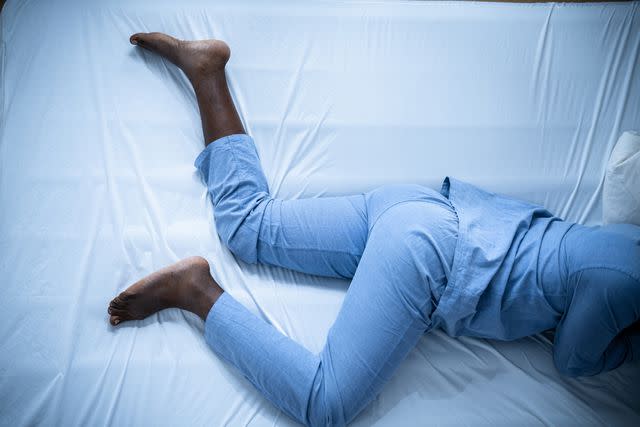Restless Legs and Magnesium: What’s the Link?
Medically reviewed by Sameena Zahoor, MD
Restless leg syndrome (RLS) is a neurologic condition that causes unpleasant feelings in the legs and an uncontrollable urge to move them. RLS tends to be worse at night and moving can relieve the unwelcomed sensations.
Over the years there have been several treatments used by healthcare providers to relieve RLS. One treatment—magnesium—has been touted as an effective treatment. However, research hasn't been able to confirm those claims.
There are many other effective treatments for RLS—like medications, iron supplements, and medication-free therapies.
This article discusses the research on magnesium as a treatment for RLS and other treatment options to consider.

AndreyPopov / Getty Images
Restless Leg Syndrome (RLS) and Magnesium
Magnesium is a mineral in the body that supports many different bodily functions like muscle and nerve function, blood sugar control, normal heart rhythm, and blood pressure maintenance. It also helps in bone development and the movement of calcium and potassium through the body's cells.
Anecdotal reports and some older studies suggested that magnesium could help the leg muscles relax and reduce RLS symptoms. But more recent evidence supporting the theory is scant, and results have been mixed.
For example, one study found that pregnant people with RLS had lower amounts of magnesium in their blood compared to those without the condition; however, another study found that people with RLS had higher levels instead.
Altogether, a 2019 review of studies concluded that there isn't enough evidence to show that magnesium is effective for relieving RLS.
Research is ongoing, however. One trial published in 2022 gave 75 people with RLS daily doses of either magnesium, vitamin B6, or a placebo. After a month, people receiving magnesium or B6 reported better sleep quality and less-severe RLS.
Magnesium Deficiency
While magnesium is not an important mineral in relation to RLS, it is an important mineral for several other body functions.
Most people's bodies make sure magnesium levels are adequate, and they do not need supplements. But certain health conditions and medications can cause magnesium deficiencies.
Symptoms of magnesium deficiency are:
Nausea and vomiting
Loss of appetite
Fatigue
Cramps
Muscle weakness
Seizures
Related: Which Types of Magnesium Are Good for Sleep?
Other Treatment Options for RLS
While magnesium may not be a proven treatment option for RLS, there are many other therapies available. Iron supplementation is a common therapy, along with medication and medication-free options.
Iron
Iron replacement is a treatment used for RLS. Iron levels are taken in the early morning before food has been eaten. If iron levels are low then iron replacement is recommended. For some people with normal iron levels, supplementation may still be used as well.
Most people can take an iron pill in the form of ferrous sulfate. Taking the pill with vitamin C, like a glass of orange juice, may help with iron absorption. Make sure to avoid taking a calcium supplement or eating a large amount of dairy at the same time as the iron supplement.
RLS symptoms go away slowly over time with iron supplements. It may take several months to see complete improvement.
Medication
If iron supplements are not successful in treating RLS, medication is another option. Two of the most common medications used are Sinemet (carbidopa-levodopa) and Klonopin (clonazepam).
Sinemet is a medication that is used to treat Parkinson's disease. The levodopa changes to dopamine in the brain and carbidopa allows levodopa to get to the brain without being broken down. It reduces RLS symptoms but can cause something called augmentation. Augmentation is when RLS symptoms get worse after stopping a dopamine medication like Sinemet (carbidopa/levodopa).
With the risk of augmentation, Sinemet can still be a good choice for people who have occasional RLS and do not need daily medication treatment.
Klonopin (clonazepam) is a benzodiazepine that is used to treat RLS. It can cause sleepiness and decreased ability to concentrate. It is given to people who have occasional RLS symptoms.
Medication-Free Treatment
There are several medication-free treatment options for RLS. They tend to work best for people with mild RLS symptoms.
Distracting activities when at rest
Regular exercise
Avoid caffeine and alcohol
Leg massage
Adequate sleep
Treatment of other sleep disorders (like obstructive sleep apnea)
Identify and remove, if possible, any medications that could trigger RLS
Summary
RLS is a condition that causes unpleasant sensations in the legs. It is a common condition, and as many as one in 10 people have experienced RLS.
Current research points away from using magnesium to treat RLS. Studies now show that iron supplementation, medication, or medication-free strategies are effective treatments.
A Word From Verywell
RLS is an uncomfortable neurological condition that can hurt your sleep and rest. Thankfully, there are several treatment options available. If you are experiencing any RLS symptoms relieved by getting out of bed, moving, rubbing your legs, or tossing and turning, it's time to reach out to your healthcare provider to find a treatment plan that will work for you.
Frequently Asked Questions
What are common causes of restless leg syndrome?
Researchers do not exactly know what causes RLS. It has been linked to family history, nerve damage in the legs, diabetes, and chronic high alcohol use. RLS is seen more in women and tends to begin around middle age.
How do I know if I have restless leg syndrome?
You may have RLS if you have uncomfortable sensations when you sit down or rest. These sensations may cause you to get up and move around or make you feel the need to move your legs. Talk to your healthcare provider for a formal diagnosis.
What vitamins help restless leg syndrome?
Magnesium has not been found to help people with RLS. However, some people find that an iron supplement can improve their symptoms. If your healthcare provider recommends that you take iron ask about also supplementing with vitamin C. Vitamin C can help your body absorb iron more efficiently.
Read the original article on Verywell Health.

